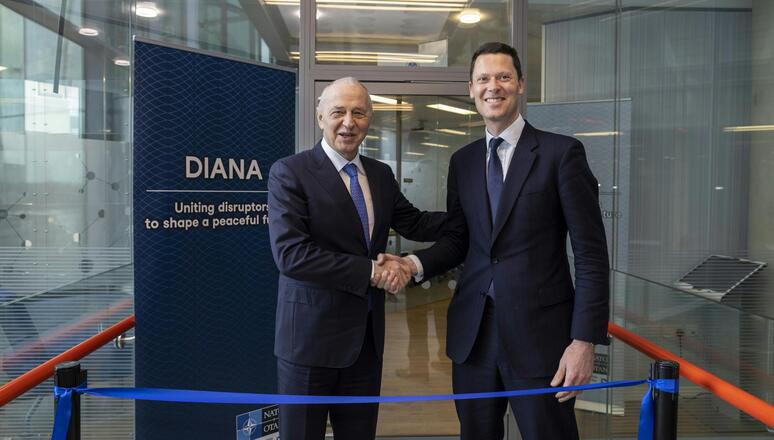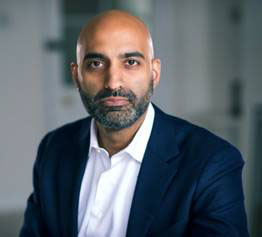NATO Deputy Secretary General opens DIANA’s European Regional Office, welcomes Managing Director
On Thursday (30 March 2023), NATO Deputy Secretary General Mircea Geoană and UK Minister for Defence Procurement Alex Chalk opened the first regional office of NATO’s Defence Innovation Accelerator for the North Atlantic (DIANA) at the Imperial College London Innovation Hub.

Located in the White City Innovation District, the European office of DIANA, an independent NATO body, is hosted in the United Kingdom in partnership with Estonia and will be supported by a regional hub in Tallinn. A North America regional office will also open in Canada and complement the DIANA structure.
“I am delighted that Imperial College’s White City Campus will host the first of DIANA’s regional offices, said Mr Geoană at the opening ceremony. “Imperial’s Innovation Hub already co-locates major defence contractors, innovators and researchers alongside UK and US government defence innovation accelerators, making it the ideal place to start this exciting new initiative,” he added.
During the event, NATO’s Assistant Secretary General for Emerging Security Challenges and DIANA’s interim Managing Director David Van Weel symbolically passed the baton on to the incoming Managing Director, Professor Deeph Chana (hyperlink to the biographical notes and photo below).
DIANA was launched at the NATO Brussels Summit in 2021. It aims to harness dual-use commercial technologies for defence and security purposes. It will focus on the nine emerging and disruptive technologies of priority to NATO: artificial intelligence, data, autonomy, quantum-enabled technologies, biotechnology, hypersonics, space, novel materials and manufacturing, and energy and propulsion. The first DIANA pilot activities will start in the autumn of 2023.
DIANA’s network brings together over 100 deep-tech test centres and start-up accelerators from across the Alliance. It will be complemented by NATO’s Innovation Fund, the world’s first multi-sovereign venture capital fund, which will invest 1 billion euros over 15 years in start-ups developing or adapting technologies to defence and security.
----------------------------------
Dr. Deeph Chana, Managing Director, Defence Innovation Accelerator for the North Atlantic (DIANA)
 “The inception of NATO’s Defence Innovation Accelerator for the North Atlantic could not come at a more appropriate moment. The world – including the global security environment – is evolving rapidly, and the Atlantic Alliance must quickly adapt to keep pace. DIANA will work to foster dual-use innovation eco-systems in Allied countries, and to ensure that NATO is technologically prepared to defend a billion citizens tomorrow and in the years to come.”
“The inception of NATO’s Defence Innovation Accelerator for the North Atlantic could not come at a more appropriate moment. The world – including the global security environment – is evolving rapidly, and the Atlantic Alliance must quickly adapt to keep pace. DIANA will work to foster dual-use innovation eco-systems in Allied countries, and to ensure that NATO is technologically prepared to defend a billion citizens tomorrow and in the years to come.”
Professor Deeph Chana joins DIANA as its first Managing Director on 2 May 2023, bringing extensive experience of working with world-leading academia, industry and government in the areas of technology, science and engineering, most recently as Co-Director of the Institute for Security Science and Technology in Imperial College Business School.
For the past three years he chaired the NATO Advisory Group on Emerging and Disruptive Technologies.
Professor Chana is the founder of a STEM consultancy specialising in enterprise technology and critical-infrastructure applications and has been involved in numerous successful commercial technology projects in the private sector.
He previously worked as a senior science and technology official within the UK Government, delivered advice to four Secretaries of State, and served as chairman on numerous high-profile national and international technology working groups.
Professor Chana has established national and international research calls in science and technology and has acted as a board member and bid reviewer for programmes in the Home Office, the US Department of Homeland Security, and the EU’s Framework Programme for Research.
He holds MSci and PhD degrees in Physics from King’s College London.
